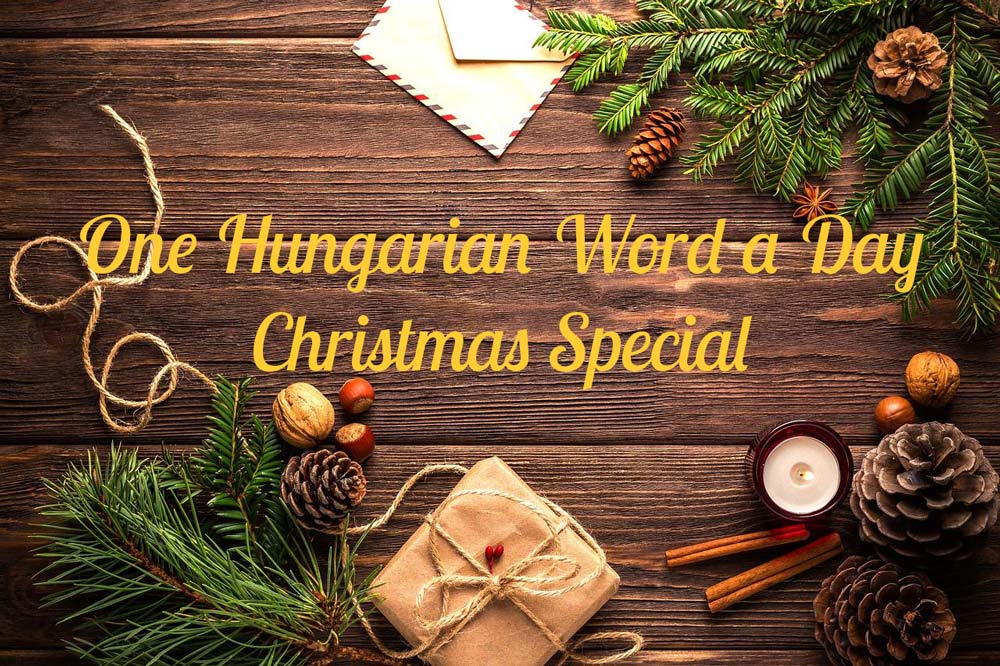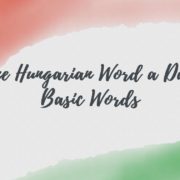
Boldog Karácsonyt!
Today’s word of the day is a bit different from the others – we’re doing a Christmas special where we’ll teach you every Christmas-related term imaginable.
If you want to send a card or otherwise give your festive wishes to your Hungarian partner, in-laws, family or friends – this lesson is for you.
Meaning:
Merry Christmas!
Pronunciation:
Boldog Karácsonyt!
Example sentences:
Boldog, békés karácsonyt kívánok neked és az egész családodnak.
Happy, peaceful Christmas(acc.) wish-I for-you and the whole family-yours.
I wish you and your family a happy and peaceful Christmas. (A typical greeting that would go on a Hungarian Christmas card)
Áldott, szeretetben gazdag ünnepeket kívánok.
Blessed, love-in rich holidays wish-I.
I wish you blessed holidays rich in love. (Another greeting you can put on your Christmas card)
Kellemes karácsonyi ünnepeket és boldog új évet kívánok.
Pleasant Christmas-y holidays(acc.) and happy new year(acc.) wish-I.
I wish you a pleasant Christmas and a happy New Year. (and another one.)
Note: As opposed to most common languages, holidays (even the holiest ones!) are lowercased in Hungarian.
Related terms:
ajándék – present, gift
békés / béke – peaceful / peace
boldog – happy
BUÉK – that’s what you say to wish someone a happy New Year. It’s the acronym of “Boldog Új Évet Kívánok” (Happy New Year(acc.) Wish-I)
csillagszóró – sparkler (children love to lit them under the tree during the Christmas days)
gyertya – candle
Jézuska – Baby Jesus (in Hungary, it differs from family to family who brings the presents. One option is “Jézuska” aka Baby Jesus)
karácsony – Christmas
karácsonyfa – Christmas tree
karácsonyfadísz – Christmas tree decorations
kellemes – pleasant
Mikulás – St Nicholas (he brings little gifts on Dec 6
th, on St Nicholas’ day)
szaloncukor – the Hungarian Christmas candy. It’s usually a piece of jelly (but can be coconut flakes, as well) coated by dark chocolate and wrapped into a colourful piece of paper. Next to eating it, it is a typical and beloved Christmas tree ornament because it’s so colourful.
You can get the idea from these images.
szilveszter – New Year’s Eve
Télapó – “Winter Father” – in some families, he is the one who brings the gifts. He is similar to “Mikulás”, but doesn’t have the religious connotation
tűzijáték – fireworks
újév – New Year (the first day of the new year)
újévi fogadalom – New Year’s resolution
ünnep – festivity
Did you like today’s word? Do you have a favorite memory hook for it or do you get it into your brain in a completely different way? Did we miss something in the explanation?
Share your thoughts, word visualizations or learning tips below in the comments and remember, the more you use a new word, the easier it will stick in your memory!
Wanna learn more?




I’m curious, what is the meaning and history of szilveszter? In English, Silvester is a man’s name. So I’m wondering how it got the meaning of New Year’s Eve.
Hi Bastette,
that’s a good question! I had to look it up and it seems that it goes back to Pope Sylvester I:
https://en.wikipedia.org/wiki/Pope_Sylvester_I
has decided to abandon plans altogether to fill its weekday evening 9pm time slot with a regular anchor or opinion host following the firing of Chris Cuomo more than one year ago, in December 2021.Instead, the network will present a variety of programming including a range of special reports, all under the banner: ‘CNN Primetime’ in a shift towards what’s being termed, ‘news not names’.Such content might include one-on-one interviews with newsmakers, town halls that put government officials in direct contact with the people affected by policy decisions other ‘scoops’, the network has said.The move is something of a departure for CNN from having a single presenter in a regular time slot such is the form at rivals MSNBC where Rachel Maddow hosts or at where Sean Hannity rules the roost at that hour.CNN’s new approach is part of a larger effort by its parent company, Warner Bros.
Discovery, to position the network as ‘the place for fact-based reporting and thoughtful discourse,’ CEO David Zaslav stated to investors last week. CNN is to introduce a new format for its 9pm following the firing of Chris Cuomo with the slot now being known as ‘CNN Primetime’ The move is something of a departure for the network from having a single presenter in a regular time slot such as is the form at MSNBC where Rachel Maddow hosts or at Fox News where Sean Hannity rules the roost.CNN’s challenge comes with the knowledge that traditional, straight news programming, has generally not brought in the viewing figures needed to beat its competitors, both of which rely heavily on opinion and personality-led programming.For 25 years at CNN, the network’s 9pm slot was home to Larry King and his legendary Larry King Live show from 1985 to 2010.Piers Morgan then took over with his show Piers Morgan Live but it was shelved in 2014 after just three years routinely being beaten in the ratings by cable competitors.CNN’s previous chief Jeff Zucker, then gave the hour to correspondent Chris Cuomo, whose brash style proved to be a winning formula as he brought in some of the network’s biggest audiences. For 25 years, the network’s 9pm slot was home to Larry King and his legendary Larry King Live show from 1985 to 2010 Piers Morgan then took over with his show Piers Morgan Live but it was shelved in 2014 after just three years routinely being beaten in the ratings by cable competitors Cuomo said he was ready to ‘kill everyone, including myself’ after his ousting from CNN following the revelation that he was advising his brother, the governor, through his sexual harassment scandalCuomo was then ousted from the struggling network in 2021 over his role advising his brother, then-Governor Andrew Cuomo, as he battled a sexual misconduct scandal. It was revealed that Chris used his media connections and contacts to check on stories in the pipeline about his brother and trafficked the information back to the governor’s operatives. Since Cuomo’s departure, CNN has rotated various personnel in the slot, including hosts such as Jake Tapper and Michael Smerconish.Cuomo, who is now back behind a desk, revealed earlier this month how he thought about ‘kill(ing) everybody, including myself,’ in the aftermath of his ousting from the struggling network.Cuomo shared his struggle on ‘,’ the podcast hosted by the former White House communications director whose tenure at the podium lasted all of a week and a half. Chris Cuomo now hosts a show on NewsNation that brings in about a-tenth of the viewers his CNN show did CNN hopes to move on from drama after the bombshell ousters of host Chris Cuomo and network boss Jeff Zucker (together above in 2014) ‘I had to accept [the CNN termination] because I was going to kill everybody, including myself.
Things can consume you,’ he said.Cuomo said he ‘makes a lot of mistakes’ and began seeing a therapist after being ‘s**t-canned’ by the CNN higher-ups.’There is damage that is relatable, there is damage that is unrelatable to people that I have to deal with, that I am working on,’ he said.Despite Cuomo telling Scaramucci that he’s working on himself, his short temper is still reportedly calling the shots at his new NewsNation gig, at which he has significantly fewer eyeballs on him than at CNN.’Cuomo,’ the name of his show, is bringing in fewer than 100,000 viewers a night, according to the New York Post.
Less than a tenth of his million-strong audience at CNN.He said that even though he wasn’t ‘the big name’ at CNN, his show did well ‘because I was giving people what they needed in that moment.’Now, however, he said he is aware his audience is ‘small’ and ‘people don’t want to watch.’It’s hard to keep perspective on that because it’s kind of embarrassing,’ he told Scaramucci.
‘I will never be [number 1] again.”I believe that was taken, I believe wrongly. I will litigate that. I am not going to b***h about it in the press,’ he said. The move to move away from personality-led programming at 9pm is the latest by CEO Chris Licht, who is trying to widen the network’s appeal Rather than rely on a single anchor or host, the news outlet will fill now fill the 9pm hour with range of different special reports including one-on-one interviews or town hall eventsThe younger Cuomo is suing CNN for more than $60million over his abrupt firing.
He is also believed to be in litigation with HarperCollins, the publisher of his book, Deep Denial, which was canceled after his firing.CNN has made a number of changes since new boss Chris Licht took the helm.When Licht took over as Chairman and CEO of the network in May 2022, he said he did not anticipate layoffs, but that story changed in October when he told employees some cost-cutting measures would be taking place translating into a number of staff changes and dismissals.In December, the network laid off hundreds of staff members including on-air talent and contributors like Brian Stelter, John Harwood, Preet Bharara, Dan Merica, Alison Kosik, and Chris Cillizza.Licht described in a town hall meeting that ‘this is an organization that has had gut punch after gut punch after gut punch,’ adding, ‘most of the organizations out there wouldn’t have survived.’Rising inflation, decreasing ad revenue, drop in ratings in cable news and concerns from investors on the economic outlook, has been some of the reasons why CNN had to implement some draconian methods.
A trans predator who raped a friend with ‘her penis’ was convicted of having sex with an underage teenage girl when she was a man, MailOnline can reveal.Lexi-Rose Crawford was an 18-year-old biological male called Dominic Risden when he was jailed for four years in 2017 for having sex with the girl he met online.But around the start of 2019, Crawford, 24, began identifying as a woman, using a female name and feminine pronouns as her release from custody loomed.
Within weeks of her release on license, she raped her vulnerable friend. Crawford pleaded not guilty to the rape, saying she suffered from blackouts and could not remember the incident. But jurors took .It is believed the trans predator will be sent to a male prison if she is given a custodial sentence for rape, despite being referred to as Miss by lawyers and Judge Michael Longman throughout her four-day trial last week. Lexi-Rose Crawford, 24, has been convicted of raping a friend with ‘her penis’ just weeks after being released from prison for child sex offencesThe former volunteer guitar technician stared blankly ahead as guilty verdicts to rape and sexual assault were returned.
She was released on conditional bail until sentencing in May.<div class="art-ins mol-factbox floatRHS news" data-version="2" id="mol-33cca1b0-c27e-11ed-a557-bd97a7fa0847" website rapist previously jailed for having sex with girl, 15, as a man